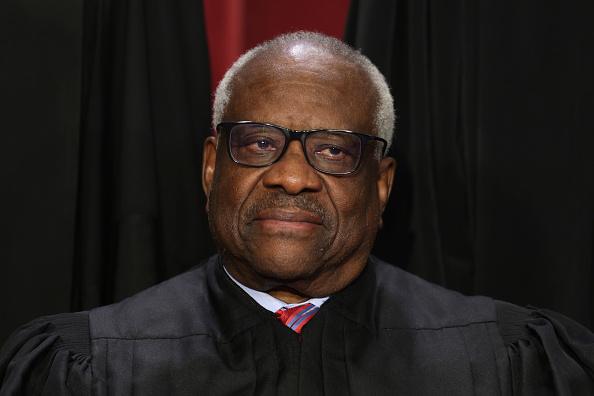Justice Thomas has 'serious doubts' about binding nature of mass-tort bellwether trials

On Monday, U.S. Supreme Court Justice Clarence Thomas expressed his “serious doubts” about using bellwether trials in multidistrict litigation to prevent defendants from relitigating issues decided in lawsuits by different plaintiffs. Photo by Alex Wong/Getty Images.
U.S. Supreme Court Justice Clarence Thomas on Monday expressed his “serious doubts” about using bellwether trials in multidistrict litigation to prevent defendants from relitigating issues decided in lawsuits by different plaintiffs.
Thomas voiced his concern about “nonmutual offensive collateral estoppel” in a dissent from the Supreme Court’s decision to deny certiorari in an appeal by E.I. du Pont de Nemours & Co.
The traditional theory of collateral estoppel prevents the same parties from relitigating issues already decided. Nonmutual offensive collateral estoppel is different because it prevents relitigation of issues when the plaintiffs are different, Thomas explained.
The issue arose in a class action suit by 80,000 residents who sued E.I. du Pont de Nemours & Co. over the discharge of an allegedly carcinogenic chemical used to make nonstick cookware into the Ohio River. A court overseeing the multidistrict litigation held three nonbinding bellwether trials in cases selected by the parties. The trials resulted in verdicts for the plaintiffs. E.I. du Pont de Nemours & Co. then settled all the other MDL cases.
More plaintiffs sued, however, including Travis Abbott, who had testicular cancer, and his wife, Julie Abbott. A federal judge held that E.I. du Pont de Nemours & Co. could not relitigate issues decided in the bellwether trials regarding duty, breach and foreseeability. Causation and damages would still have to be determined, however.
After a trial, jurors awarded Travis Abbott $40 million and Julie Abbott $10 million. Julie Abbott’s award was reduced to $250,000 under a tort reform law. The 6th U.S. Circuit Court of Appeals at Cincinnati affirmed.
Thomas said it is unfair to extend the doctrine of nonmutual offensive collateral estoppel to MDL litigation, which is designed to streamline pretrial issues for all related cases. The bellwether trials are intended to gather information, and experts have described them as nonbinding, he said.
“It is quite a stretch to use a mechanism designed to handle only pretrial proceedings to instead resolve multiple elements of a claim based on a few nonbinding bellwether trials,” Thomas said. “The MDL court thus used a tiny fraction of the cases against du Pont to impose sweeping liability—all without any warning to du Pont of the bellwether trials’ import.”
Binding MDL defendants after bellwether trials raises concerns about fairness and due process issues, Thomas said.
“Given that MDLs constitute a large part of the federal docket, this issue should be resolved sooner rather than later,” he said.
Justice Brett Kavanaugh also said he would have heard the case, but he did not join Thomas’ dissent.
Publications covering Thomas’ dissent include SCOTUSblog, Reuters, Law.com and Courthouse News Service.
Write a letter to the editor, share a story tip or update, or report an error.



